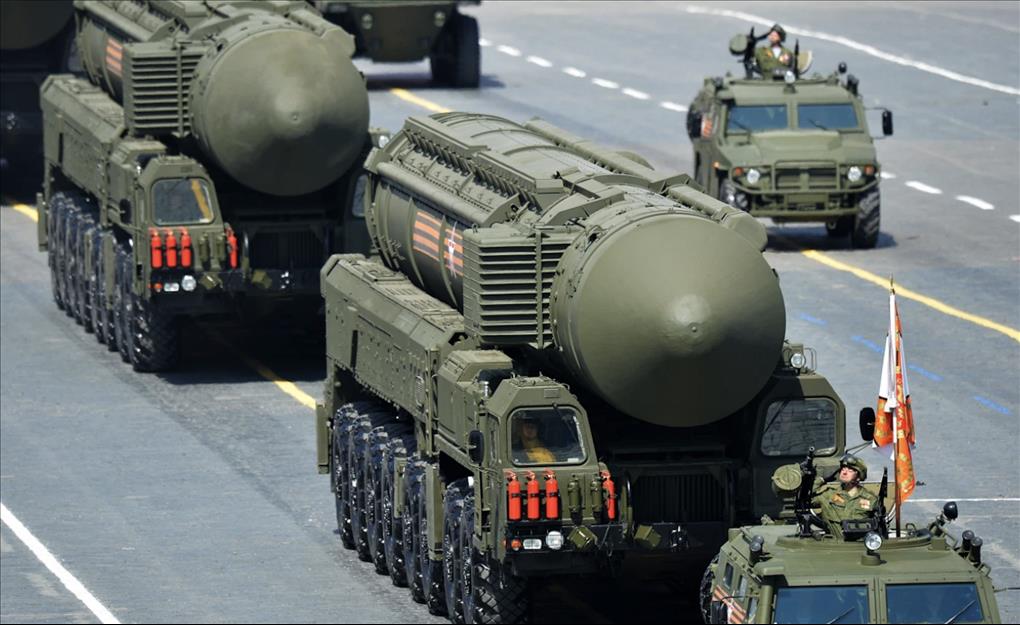
Growth of nuclear arsenals ''a worrisome sign''
(MENAFN- Asia Times) ''Every inhabitant of this planet must contemplate the day when this planet may no longer be habitable. The weapons of war must be abolished before they abolish us.''
— John F. Kennedy
While the total number of nuclear weapons in the world decreased in 2020, the estimated number of nukes deployed with operational forces increased, along with modernization and expansion programs, the Stockholm International Peace Research Institute (SIPRI) reported in its latest analysis.
The nine nuclear-armed states — the United States, Russia, the United Kingdom, France, China, India, Pakistan, Israel and the Democratic People's Republic of Korea (North Korea)— together possessed an estimated 13,080 nuclear weapons at the start of 2021.
This marked a decrease from the 13,400 that SIPRI estimated these states possessed at the beginning of 2020.
However, despite this overall decrease, the estimated number of nuclear weapons currently deployed with operational forces increased to 3,825, from 3,720 last year.
Around 2,000 of these — nearly all of which belonged to Russia or the US — were kept in a state of high operational alert.
While the US and Russia continued to reduce their overall nuclear weapon inventories by dismantling retired warheads in 2020, both are estimated to have had around 50 more nuclear warheads in operational deployment at the start of 2021 than a year earlier.
Russia also increased its overall military nuclear stockpile by around 180 warheads, mainly due to deployment of more multi-warhead land-based intercontinental ballistic missiles (ICBMs) and sea-launched ballistic missiles (SLBMs).
Both countries'' deployed strategic nuclear forces remained within the limits set by the 2010 Treaty on Measures for the Further Reduction and Limitation of Strategic Offensive Arms (New START), although the treaty does not limit total nuclear warhead inventories.
''The overall number of warheads in global military stockpiles now appears to be increasing, a worrisome sign that the declining trend that has characterized global nuclear arsenals since the end of the cold war has stalled,'' said Hans M. Kristensen, Associate Senior Fellow with SIPRI.
''The last-minute extension of New START by Russia and the US in February this year was a relief, but the prospects for additional bilateral nuclear arms control between the nuclear superpowers remain poor.''
Russia and the US together possess over 90% of global nuclear weapons.

While the US and Russia continued to reduce their overall nuclear weapon inventories by dismantling retired warheads in 2020, both are estimated to have had around 50 more nuclear warheads in operational deployment at the start of 2021 than a year earlier. Credit: Handout.
Both have extensive and expensive programs under way to replace and modernize their nuclear warheads, missile and aircraft delivery systems, and production facilities.
''Both Russia and the US appear to be increasing the importance they attribute to nuclear weapons in their national security strategies,'' said Kristensen.
All the other seven nuclear-armed states are also either developing or deploying new weapon systems or have announced their intention to do so.
The UK's ''Integrated Review of Security, Defence, Development and Foreign Policy,'' published in early 2021, reversed a policy of reducing the country's nuclear arsenal and raised its planned ceiling for nuclear weapons from 180 to 260.
China is in the middle of a significant modernization and expansion of its nuclear weapon inventory, and India and Pakistan also appear to be expanding their nuclear arsenals.
North Korea continues to enhance its military nuclear program as a central element of its national security strategy.
While it conducted no nuclear test explosions or long-range ballistic missile tests during 2020, it continued production of fissile material and development of short- and long-range ballistic missiles.
''Deployed warheads'' refers to warheads placed on missiles or located on bases with operational forces.
The 52nd edition of the SIPRI study also reported some hopeful developments in 2020.
''Despite outbreaks of conflict, rising military spending and of course the first year of a devastating global pandemic, overall global human security did not continue to deteriorate in 2020. The year's crumbs of comfort included a significant drop in the number of people who died in armed conflicts around the world'' said SIPRI Director Dan Smith.
''Unlike previous years, the international arms trade did not expand. And the Climate Action Summit made some notable — if still insufficient — progress on climate goals.''

Legal Disclaimer:
MENAFN provides the
information “as is” without warranty of any kind. We do not accept
any responsibility or liability for the accuracy, content, images,
videos, licenses, completeness, legality, or reliability of the information
contained in this article. If you have any complaints or copyright
issues related to this article, kindly contact the provider above.


















Comments
No comment